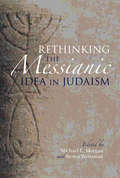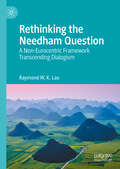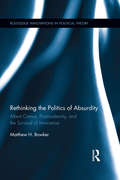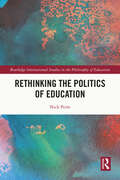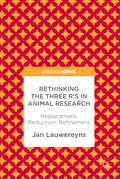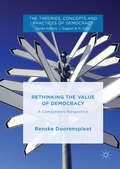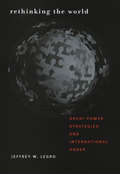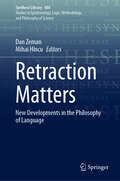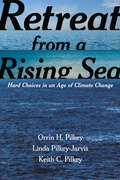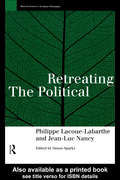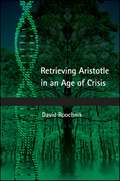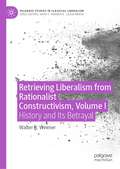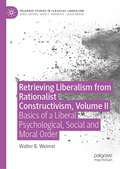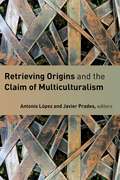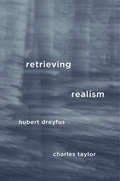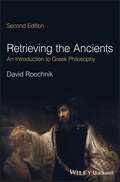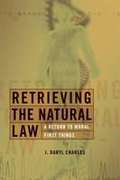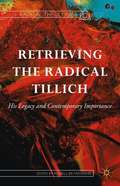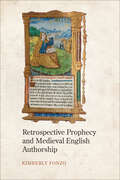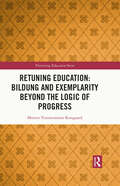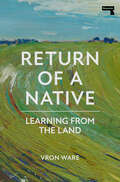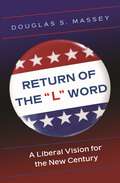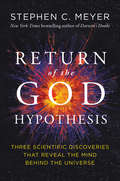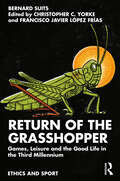- Table View
- List View
Rethinking the Messianic Idea in Judaism
by Michael L. Morgan Steven WeitzmanOver the centuries, the messianic tradition has provided the language through which modern Jewish philosophers, socialists, and Zionists envisioned a utopian future. Michael L. Morgan, Steven Weitzman, and an international group of leading scholars ask new questions and provide new ways of thinking about this enduring Jewish idea. Using the writings of Gershom Scholem, which ranged over the history of messianic belief and its conflicted role in the Jewish imagination, these essays put aside the boundaries that divide history from philosophy and religion to offer new perspectives on the role and relevance of messianism today.
Rethinking the Needham Question: A Non-Eurocentric Framework Transcending Dialogism
by Raymond W. LauThis book offers a new investigation of the Needham Question. Why did modern science emerge in Europe, but not in any of the advanced non-European civilizations? Eurocentric accounts attribute it to certain ‘qualities’ said to be ‘unique’ to Europe. Opposed to the Eurocentric view is a position known as the ‘dialogical perspective’. Dialogism argues that Europe borrowed heavily from non-European scientific knowledges, and that scientific exchanges were key to the development of modern science. Neo-Eurocentric arguments have emerged in response to the challenge of dialogism, and the debate between Eurocentrism/neo-Eurocentrism and dialogism currently stands at a stalemate. In this book, Raymond Lau brings a new theoretical-methodological framework to finally settle this debate. The historical analysis developed here shows that to secure the non-Eurocentric case, and decisively rebut Eurocentrism and neo-Eurocentrism, it is necessary to go beyond dialogism both theoretically and methodologically.
Rethinking the Politics of Absurdity: Albert Camus, Postmodernity, and the Survival of Innocence (Routledge Innovations in Political Theory)
by Matthew H. BowkerWhat does it mean to describe something or someone as absurd? Why did absurd philosophy and literature become so popular amidst the violent conflicts and terrors of the mid- to late-twentieth century? Is it possible to understand absurdity not as a feature of events, but as a psychological posture or stance? If so, what are the objectives, dynamics, and repercussions of the absurd stance? And in what ways has the absurd stance continued to shape postmodern thought and contemporary culture? In Rethinking the Politics of Absurdity, Matthew H. Bowker offers a surprising account of absurdity as a widespread endeavor to make parts of our experience meaningless. In the last century, he argues, fears about subjects’ destructive desires have combined with fears about rationality in a way that has made the absurd stance seem attractive. Drawing upon diverse sources from philosophy, literature, politics, psychoanalysis, theology, and contemporary culture, Bowker identifies the absurd effort to make aspects of our histories, our selves, and our public projects meaningless with postmodern revolts against reason and subjectivity. Weaving together analyses of the work of Albert Camus, Georges Bataille, Judith Butler, Emmanuel Levinas, and others with interview data and popular narratives of apocalypse and survival, Bowker shows that the absurd stance and the postmodern revolt invite a kind of bargain, in which meaning is sacrificed in exchange for the survival of innocence. Bowker asks us to consider that the very premise of this bargain is false: that ethical subjects and healthy communities cannot be created in absurdity. Instead, we must make meaningful even the most shocking losses, terrors, and destructive powers with which we live. Bowker's book will be of interest to scholars and practitioners in the fields of political science, philosophy, literature, psychoanalysis, sociology, and cultural studies.
Rethinking the Politics of Education (Routledge International Studies in the Philosophy of Education)
by Nick PeimRethinking the Politics of Education provides an entirely original rethinking of the modern and contemporary mythology of education. Problematizing the ideas concerning education as fulfilment and redemption, the book critically reviews the association of education with projects of social justice, democracy and improvement. This book argues for a fundamental rethinking of what education is, exploring how things stand with education and educational apparatuses in the contemporary world. It examines relations between educational discourses and their implied ontological stances and offers new ways of thinking that draw on ontological positions from psychoanalytical, philosophical and social discourses. The book contends that education is an essential form of politics and must be understood through a careful examination of its history modes of operation and its basic structures, rather than an idealized version of what it might be. Presenting an original and alternative account of a theoretically informed political ontology of education, the book will be of great interest to academics, researchers and postgraduate students interested in the philosophy of education, the politics of education, educational theory and the sociology of education.
Rethinking the Three R's in Animal Research: Replacement, Reduction, Refinement
by Jan LauwereynsThis work challenges the current reliance on "The Three R's" or Replacement, Reduction and Refinement which direct most animal research in the behavioral sciences. The author argues that these principles that were developed in the 1950's to guide the use of animals in research studies are outdated. He suggests that the notions of refinement and reduction are often ill-defined and can be useful only in cases where replacement is impossible.
Rethinking the Value of Democracy: A Comparative Perspective (The Theories, Concepts and Practices of Democracy)
by Renske DoorenspleetThis book is the first comprehensive analysis of the instrumental value of democracy in a comparative perspective. Based on extensive analyses of quantitative studies from different disciplines, it explores both the expected beneficial and harmful impact of democracy. Democracy’s reputation as delivering peace and development while controlling corruption is an important source of its own legitimacy. Yet, as this book acutely demonstrates, the arguments tend to be normatively driven interventions in ideologically charged policy debates. The book argues that we need neither a utopian framing of democracy as delivering all ‘good things’ in politics nor a cynical one that emphasizes only the ‘dangerous underbelly’ of this form of government. The author also raises critical questions about the value of the study of democracy: the choice for particular concepts and measures, the unknown mechanisms, and the narrow focus on specific instrumental values. This volume will be necessary reading for anyone interested in debates on democracy in the contemporary global context.
Rethinking the World: Great Power Strategies and International Order
by Jeffrey W. LegroStunning shifts in the worldviews of states mark the modern history of international affairs: how do societies think about—and rethink—international order and security? Japan's "opening," German conquest, American internationalism, Maoist independence, and Gorbachev's "new thinking" molded international conflict and cooperation in their eras. How do we explain such momentous changes in foreign policy—and in other cases their equally surprising absence? The nature of strategic ideas, Jeffrey W. Legro argues, played a critical and overlooked role in these transformations. Big changes in foreign policies are rare because it is difficult for individuals to overcome the inertia of entrenched national mentalities. Doing so depends on a particular nexus of policy expectations, national experience, and ready replacement ideas. In a sweeping comparative history, Legro explores the sources of strategy in the United States and Germany before and after the world wars, in Tokugawa Japan, and in the Soviet Union. He charts the likely future of American primacy and a rising China in the coming century. Rethinking the World tells us when and why we can expect changes in the way states think about the world, why some ideas win out over others, and why some leaders succeed while others fail in redirecting grand strategy.
Retraction Matters: New Developments in the Philosophy of Language (Synthese Library #488)
by Dan Zeman Mihai HîncuThis book offers the first sustained investigation of the phenomenon of retraction - the “taking back” of the conventional or deontic effects of a previous speech act - bringing together issues and solutions from the semantics of perspectival expressions and from the framework of Speech Act theory. It addresses questions that have been at the center of lively debates in philosophy of language and linguistics, but also draws out some of the ramifications these questions have for certain debates in the logic of discourse, philosophy of mind or experimental philosophy. Many times, what we say on a certain occasion proves to be wrong. When we realize this, we sometimes react by retracting what was previously said – formally or informally, explicitly or not. The essays in this volume tackle issues such as what are the necessary and sufficient conditions for successfully performing a retraction, whether there is a solid empirical basis for retraction, whether the phenomenon can be used in favor or against certain semantics views, whether there is a type of retraction that is merely verbal, or what are the ethical implications of retraction. The volume brings together and puts in dialogue renowned researchers on these topics, serving both as a fixture for specialists and as an introduction into the topic of retraction.
Retreat from a Rising Sea: Hard Choices in an Age of Climate Change
by Orrin H. Pilkey Linda Pilkey-Jarvis Keith C. PilkeyMelting ice sheets and warming oceans are causing the seas to rise. By the end of this century, hundreds of millions of people living at low elevations along coasts will be forced to retreat to higher and safer ground. Because of sea-level rise, major storms will inundate areas farther inland and will lay waste to critical infrastructure, such as water-treatment and energy facilities, creating vast, irreversible pollution by decimating landfills and toxic-waste sites. This big-picture, policy-oriented book explains in gripping terms what rising oceans will do to coastal cities and the drastic actions we must take now to remove vulnerable populations.The authors detail specific threats faced by Miami, New Orleans, New York, and Amsterdam. Aware of the overwhelming social, political, and economic challenges that would accompany effective action, they consider the burden to the taxpayer and the logistics of moving landmarks and infrastructure, including toxic-waste sites. They also show readers the alternative: thousands of environmental refugees, with no legitimate means to regain what they have lost. The authors conclude with effective approaches for addressing climate-change denialism and powerful arguments for reforming U.S. federal coastal management policies.
Retreating the Political (Warwick Studies in European Philosophy #5)
by Jean-Luc Nancy Phillippe Lacoue-LabartheThis collection of essays presents, for the first time in English, some of the key essays on the political by Philippe Lacoue-Labarthe and Jean-Luc Nancy. Including several unpublished essays, Retreating the Political offers some highly original perspectives on the relationship between philosophy and the political. Through contemporary readings of the political in Freud, Heidegger and Marx, the authors ask if we can talk of an a priori link between the philosophical and the political; they investigate the significance of the 'figure' - the human being as political subject - in the history of metaphysics; and they inquire how we can 're-treat' the political today in the face of those who argue that philosophy is at an 'end'.
Retrieving Aristotle in an Age of Crisis (SUNY series in Ancient Greek Philosophy)
by David RoochnikIn 1935 Edmund Husserl delivered his now famous lecture "Philosophy and the Crisis of European Humanity," in which he argued that the "misguided rationalism" of modern Western science, dominated by the model of mathematical physics, can tell us nothing about the "meaning" of our lives. Today Husserl's conviction that the West faces a crisis is no longer an abstraction. With the ever-present threat of nuclear explosion, the degradation of the oceans, and the possibility that climate change will wreak havoc on civilization itself, people from all walks of life are wondering what has gone so terribly wrong and what remedies might be available.In Retrieving Aristotle in an Age of Crisis, David Roochnik makes a lucid and powerful case that Aristotle offers a philosophical resource that even today can be of significant therapeutic value. Unlike the scientific revolutionaries of the seventeenth century, he insisted that both ordinary language and sense-perception play essential roles in the acquisition of knowledge. Centuries before Husserl, Aristotle was a phenomenologist who demanded that a successful theory remain faithful to human experience. His philosophy can thus provide precisely what modern European rationalism now so painfully lacks: an understanding and appreciation of the world in which human beings actually make their homes.
Retrieving Liberalism from Rationalist Constructivism, Volume I: History and Its Betrayal (Palgrave Studies in Classical Liberalism)
by Walter B. WeimerThis first volume, History and its Betrayal, traces the development of major themes of liberalism from the increase in human population beyond the limits of the face-to-face society of tribalism and small groups up until the present day. It shows that the principles underlying liberalism are the evolutionary development of social organizations that have resulted from the complexity of human action rather than any conscious design or purpose.This book draws out the differences between the classical liberalism dependent upon spontaneous and tacit ordering as a result of evolution, and the explicit or conscious or directed version of progressivism. It shows that the most important recent developments in the philosophy of rationality and the methodology of scientific research, as well as in evolutionary epistemology and the philosophy of biology, actually stem from the theories of complex social organization of the moralists such as Hume, Ferguson, and Smith. The book shows clearly that classical liberalism was never refuted—indeed, no attempt to do so has been offered—it has simply been ignored in favour of programs which sound beneficial and soothing but which cannot be instituted without returning to tribalism.
Retrieving Liberalism from Rationalist Constructivism, Volume II: Basics of a Liberal Psychological, Social and Moral Order (Palgrave Studies in Classical Liberalism)
by Walter B. WeimerThis second volume, Basics of a Liberal Psychological, Social and Moral Order, overviews developments in the theory of spontaneously ordered complex phenomena, the psychology of inference and expectation, the nature of anticipatory systems in the psychological and economic domains, and the evolution of scientific thought and knowledge. The book applies these insights to the nature of markets and morals, what education should consist of, and the problems of alienation and our existential malaise as we move into an increasingly abstract society. In doing so it also shows the unscientific nature of the rationalist constructivist approach of progressivism, and the disastrous consequences that would arise from following these positions. The book shows the complex interplay between top-down or directed structures (what Hayek and others have called taxis organizations) and far more complex orders of the social or psychological cosmos in which they are embedded as constituents. It details how the key to the market orders of society depends upon their capacity to impersonally convey information to agents. Markets can serve unknown and unforeseen ends for individuals who do not know or have contact with other market participants. This is a vastly more powerful and productive system than anything that can arise in a tribal or face-to-face organization limited to personal contact, such as the sort proposed by the constructivists. The book will be of interest to academics and scholars in classical liberalism, economics and political philosophy.
Retrieving Origins and the Claim of Multiculturalism
by Antonio Lopez Javier Prades Angelo ScolaThis book explores the philosophical, legal, and theological roots of Western multiculturalism, that is, the encounter and coexistence of different cultures within a liberal society. Rather than concerning themselves with the particulars of cultural dialogue, the authors of this volume go deeper and question the very reality of "multiculturalism" itself.As a whole the volume devotes attention to the origins of human nature, arguing that regardless of how different another person or culture seems to be, universal human experience discloses what it means to be human and to relate to others and to God. The contributors represent different cultures and faith traditions but are united in friendship and in the conviction that the Christian faith enables an authentic approach to long-standing debates on multiculturalism.Contributors:Massimo BorghesiFrancesco BotturiMarta CartabiaCarmine Di MartinoPierpaolo DonatiCostantino EspositoStanley HauerwasAntonio LopezFrancisco Javier Martínez FernandezJohn MilbankJavier PradesDavid L. SchindlerAngelo Cardinal ScolaLorenza VioliniJoseph H. H. Weiler
Retrieving Realism
by Charles Taylor Hubert Dreyfus"A picture held us captive," writes Wittgenstein in the Philosophical Investigations, describing the powerful image of mind that underlies the modern epistemological tradition from Descartes onward. Retrieving Realism offers a radical critique of the Cartesian epistemic picture that has captivated philosophy for too long and restores a realist view affirming our direct access to the everyday world and to the physical universe. According to Descartes, knowledge exists in the form of ideas in the mind that purportedly represent the world. This "mediational" epistemology-internal ideas mediating external reality-continues to exert a grip on Western thought, and even philosophers such as Quine, Rorty, and Davidson who have claimed to refute Descartes remain imprisoned within its regime. As Hubert Dreyfus and Charles Taylor show, knowledge consists of much more than the explicit representations we formulate. We gain knowledge of the world through bodily engagement with it-by handling things, moving among them, responding to them-and these forms of knowing cannot be understood in mediational terms. Dreyfus and Taylor also contest Descartes's privileging of the individual mind, arguing that much of our understanding of the world is necessarily shared. Once we deconstruct Cartesian mediationalism, the problems that Hume, Kant, and many of our contemporaries still struggle with-trying to prove the existence of objects beyond our representations-fall away, as does the motivation for nonrealist doctrines. We can then begin to describe the background everyday world we are absorbed in and the universe of natural kinds discovered by science.
Retrieving Realism
by Hubert DreyfusFor Descartes, knowledge exists as ideas in the mind that represent the world. In a radical critique, Hubert Dreyfus and Charles Taylor argue that knowledge consists of much more than the representations we formulate in our minds. They affirm our direct contact with reality--both the physical and the social world--and our shared understanding of it.
Retrieving the Ancients: An Introduction to Greek Philosophy
by David RoochnikProvides an accessible introduction to ancient Greek philosophy, enhanced with new features and content Retrieving the Ancients offers a clear and engaging narrative of one of the most fertile periods in the history of human thought, beginning with the Ionian Philosophers of the sixth century and concluding with the works of Aristotle. Organized chronologically, this student-friendly textbook approaches Greek philosophy as an illuminating conversation in which each key thinker—including Thales, Pythagoras, Democritus, Socrates, and Plato—engages with, responds to, and moves beyond his predecessor. Throughout the text, author David Roochnik highlights how this conversation remains as relevant and urgent to modern readers as ever. Now in its second edition, Retrieving the Ancients features an entirely new epilogue that introduces Stoicism, Epicureanism, Skepticism, Cynicism, and various schools of thought that emerged after Aristotle, as well as a useful appendix designed to help students write philosophically. This edition offers expanded online teaching resources for instructors, including a downloadable web pack with sample syllabi. Offers a compelling, readable, and humorous introduction to ancient Greek philosophy Approaches the history of ancient Greek philosophy dialectically Illustrates how the works of the ancients are as valuable today as ever Includes an accessible, modern introduction to Hellenistic philosophers, new to this editionOffering a sophisticated yet accessible account of the first philosophers of the West, Retrieving the Ancients: An Introduction to Greek Philosophy, Second Edition is an ideal textbook for introductory and intermediate undergraduate courses in Ancient Greek Philosophy, as well as general courses in Ancient Philosophy.
Retrieving the Natural Law: A Return to Moral First Things (Critical issues in Bioethics Series)
by J. CharlesRestating what all people intuit and what this means in moral, specifically bioethical, discourse is the raison d'être for this volume. J. Daryl Charles argues that a traditional metaphysics of natural law lies at the heart of the present reconstructive project, and that a revival in natural-law thinking is of the highest priority for the Christian community as we contend in, rather than abdicate, the public square. <p><p> Nowhere is this more on display than in the realm of bioethics, where the most basic moral questions -- human personhood, human rights versus responsibilities, the reality of moral evil, the basis of civil society -- are being debated. With his timely application of natural-law thinking to the field of bioethics, Charles seeks to breathe new life back into this key debate.
Retrieving the Radical Tillich
by Russell Re ManningPaul Tillich is best known today as a theologian of mediation. Many have come to view him as an out-of-date thinker a safe exemplar of a mid-twentieth-century theological liberalism. The way he has come to be viewed contrasts sharply with the current theological landscape one dominated by the notion of radicality. In this collection, Russell Re Manning breaks with the widespread opinion of Tillich as 'safe' and dated. Retrieving the Radical Tillich depicts the thinker as a radical theologian, strongly marked but never fully determined by the urgent critical demands of his time. From the crisis of a German cultural and religious life after the First World War, to the new realities of religious pluralism, Tillich's theological responses were always profoundly ambivalent, impure and disruptive, asserts Re Manning. The Tillich that is outlined and analyzed by this collection is never merely correlative. Far from the dominant image of the theologian as a liberal accommodationist, Re Manning reintroduces the troubled and troubling figure of the radical Tillich.
Retrospective Prophecy and Medieval English Authorship
by Kimberly FonzoThe prescience of medieval English authors has long been a source of fascination to readers. Retrospective Prophecy and Medieval English Authorship draws attention to the ways that misinterpreted, proleptically added, or dubiously attributed prognostications influenced the reputations of famed Middle English authors. It illuminates the creative ways in which William Langland, John Gower, and Geoffrey Chaucer engaged with prophecy to cultivate their own identities and to speak to the problems of their age. Retrospective Prophecy and Medieval English Authorship examines the prophetic reputations of these well-known medieval authors whose fame made them especially subject to nationalist appropriation. Kimberly Fonzo explains that retrospectively co-opting the prophetic voices of canonical authors aids those looking to excuse or endorse key events of national history by implying that they were destined to happen. She challenges the reputations of Langland, Gower, and Chaucer as prophets of the Protestant Reformation, Richard II’s deposition, and secular Humanism, respectively. This intellectual and critical assessment of medieval authors and their works successfully makes the case that prophecy emerged and recurred as an important theme in medieval authorial self-representations.
Retuning Education: Bildung and Exemplarity Beyond the Logic of Progress (ISSN)
by Morten Timmermann KorsgaardThis book responds to the need for new ways of defining the aims and forms of education, in an age that has seen the ideals of progress and growth lead the planet and its inhabitants to the brink of extinction.Arguing that contemporary ideas of performance and accountability counter "the heart" of education, the book calls for a retuning of education that encourages the younger generation to study objects and ideas for their own sake, rather than to appease established and conventional notions in society – therefore stepping into a common space of reflection and study. The chapters examine why and how we educate, and offer the alternative of engaging with educational questions, not determined by the logic of progress and growth but with an objective of creating a relation to the world around us. Using the works of Hannah Arendt combined with the tradition of Allgemeine Pädagogik to argue for a new conception of Bildung, the book encourages a method that emphasises outrospection over introspection.Ultimately questioning modern-day education, the book redirects and retunes education away from being wholly concerned with achievement and growth, and will therefore be of interest to students, researchers and academics in the fields of philosophy of education, education and curriculum studies, education policy and politics, and sociology of education.
Return of a Native: Learning from the Land
by Vron WareFrom a fixed point in the middle of English nowhere, Vron Ware takes you through time and space to explain why transcending the urban-rural divide is integral to the future of the planet.Rural England is a mythic space, a complex canvas on which people from many different backgrounds project all kinds of fantasies, prejudices, desires and fears. This book seeks to challenge many of these ideas, showing how the artificial divide between rural and urban works to conceal the underlying relationship between these two fundamental poles of human settlement.This investigation of rurality is oriented from a fixed point in north-west Hampshire, marked by a signpost that points in four directions to two towns, four villages and two hamlets. Through stories, interviews and reportage gathered over two decades, the book demolishes tired notions of rural England that cast it as a separate realm of existence, whether marooned in a perpetual time-warp, or reduced to a refuge for the retired, wealthy urbanites, extreme nature-lovers, and, more recently, anyone tired of waiting out the pandemic in towns and cities. It poses two simple questions: what does the word rural mean today? What will it mean tomorrow?The author is an ambivalent native, held captive to the land by an umbilical cord but always on the verge of fleeing home to the city. She writes from a feminist, postcolonial standpoint that is alert to the slow violence of historical processes taking place over many centuries; enslavement, colonialism, industrialisation, globalisation. Both argument and narrative are propelled by the urgent need to reconsider the concept of &‘countryside&’ in the context of the climate emergency and the patent collapse of ecosystems due to intensive farming which has poisoned the land.
Return of the "L" Word: A Liberal Vision for the New Century
by Douglas S. MasseySomewhere in the 1970s liberals in the United States lost their way. After successes like the New Deal, they became arrogant. So argues Douglas Massey in Return of the "L" Word. Faced with the difficult politics of race and class, liberals used the heavy hand of government to impose policies on a resentful public. Conservatives capitalized on this with a staunch ideology of free markets, limited government, and conservative social values. The time is ripe for a liberal realignment, declares Massey, but what has been lacking is a consistent liberal ideology that explains to voters, in simple terms, government's vital role in producing a healthier, more financially equitable, less divided society. This book supplies that ideology. Massey begins his powerful manifesto by laying out the liberals' mistakes over the past twenty years. Drawing on insights from the expanding field of economic sociology, he then sets forth a clear set of liberal principles to explain how markets work in society, principles he applies to articulate salable liberal policies. After outlining a new liberal political philosophy, Massey traces liberalism's opposition and says plainly: liberals should have no illusions about the competition's resolve and skill. He closes with a practical approach to liberal coalition-building in America. The political economy conservatives have constructed in recent decades has benefited 20 percent of the people. Liberal success requires a return to material rather than symbolic politics, showing most Americans why it is in their economic as well as moral interest to support the liberal cause.
Return of the God Hypothesis: Three Scientific Discoveries That Reveal the Mind Behind the Universe
by Stephen C. MeyerThe New York Times bestselling author of Darwin’s Doubt presents groundbreaking scientific evidence of the existence of God, based on breakthroughs in physics, cosmology, and biology. Beginning in the late 19th century, many intellectuals began to insist that scientific knowledge conflicts with traditional theistic belief—that science and belief in God are “at war.” Philosopher of science Stephen Meyer challenges this view by examining three scientific discoveries with decidedly theistic implications. Building on the case for the intelligent design of life that he developed in Signature in the Cell and Darwin’s Doubt, Meyer demonstrates how discoveries in cosmology and physics coupled with those in biology help to establish the identity of the designing intelligence behind life and the universe. Meyer argues that theism — with its affirmation of a transcendent, intelligent and active creator — best explains the evidence we have concerning biological and cosmological origins. Previously Meyer refrained from attempting to answer questions about “who” might have designed life. Now he provides an evidence-based answer to perhaps the ultimate mystery of the universe. In so doing, he reveals a stunning conclusion: the data support not just the existence of an intelligent designer of some kind—but the existence of a personal God.
Return of the Grasshopper: Games, Leisure and the Good Life in the Third Millennium (Ethics and Sport)
by Bernard SuitsIn this sequel to Bernard Suits’ timeless classic philosophical work The Grasshopper: Games, Life and Utopia, published in its full and unabridged form for the first time, Suits continues to explore some of our most fundamental philosophical questions, including the value of sport and games, and their relationship to the good life. In Return of the Grasshopper, Suits puts his theoretical cards on the table, exploring the in-depth implications of his definition of utopia, assessing the merits of a gamified philosophy, and explaining how games can provide an existential balm against the fear of death. Perhaps most importantly, for the first time in print, Suits reveals his underlying worldview: that humanity is forever fated to endure a cyclical existence of privation, brought on by material scarcity, and boredom, resulting from material plenitude. An essential companion to The Grasshopper, this edition includes an introductory chapter that puts Suits’ life and work into context, helping the reader to understand why Suits has had such a profound influence on contemporary philosophy and how his ideas still provide powerful insight into the human condition. This book is important reading for anybody with an interest in the philosophy of sport, leisure and play, political philosophy, ethics, existentialism or utopian studies.
